Sara worked by herself as a one-woman shoemaking business. When she finally decided to pass on her skills, she founded a school instead – and found a community of warm friends who helped her build her school, grow her business, and fill her days. This is Sara’s story of how she started the Chicago School of Shoemaking and Leather Arts.
Sara ran her business by herself
For over 40 years, Sara made shoes by herself.
It all started when her favorite pair of desert boots were falling apart. Being practical and curious, Sara took the boots apart to try to duplicate the pattern. She asked some leatherworkers for the tools she needed and figured it out herself. That turned into helping others adjust their shoes, and that turned into a custom shoemaking business.
Sara went to art fairs and festivals, taking measurements and deposits, then returning home to make and finish her shoes. She was entirely self-taught, and even developed her own novel techniques. That allowed Sara’s Shoes to have its niche: mail-order, custom hand-made shoes that were unlike anything sold in a store.
What Sara loved about making shoes was the freedom to make her own schedule. She could make 12 pairs in one week, and take the next week off. Making shoes allowed her to move to different states, start and raise her family, and support them. And the best moment, Sara shared, was the excitement and joy when customers tried on their new shoes and found the fit perfect.
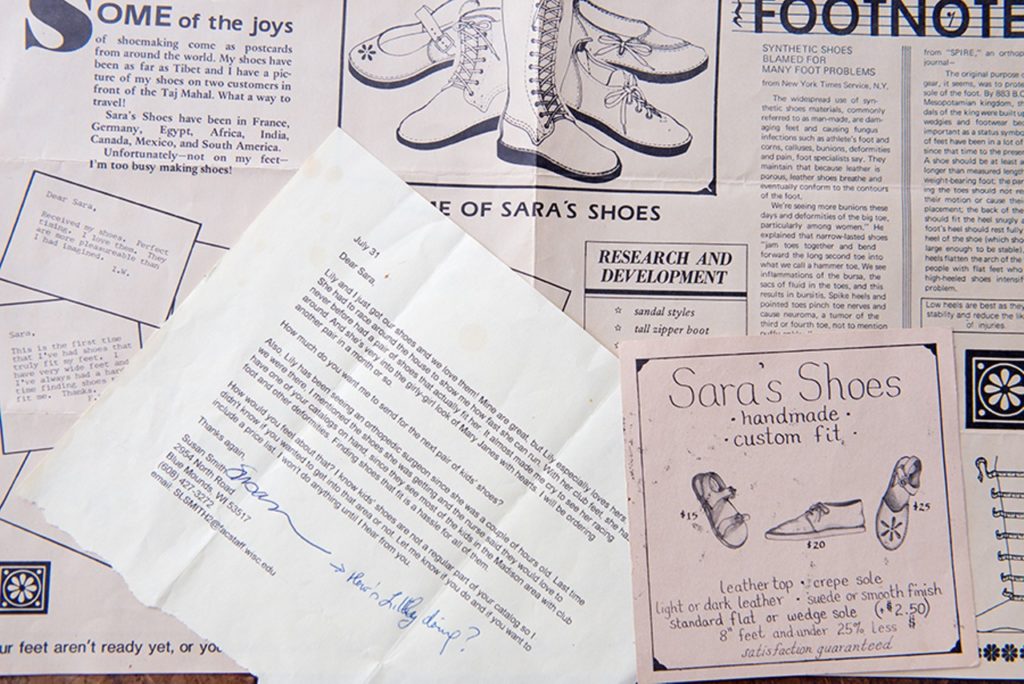
Print ads for Sara’s Shoes, and thanks from grateful customers. Via Chicago Reader.
Sara resisted passing on her skills because she didn’t want to create her own competition. She was satisfied with where she was – until the day her hands felt tired
Sara needed help to start her School as a business
Sara was on a road trip for her 60th birthday when it happened. She was driving over a hill when the thought occurred to her: Her hands were tired. She had valuable skills to share; perhaps it was time for her to share her tools and techniques with others.
On the other hand, giving up shoemaking was a scary proposition. It had been her job, her business, her identity for forty years; could she give it up? What would it take to replace her income?
And what would it mean to start her school? She could train her students in her technique, but they would all be relatively new; lacking her practice and experience, their shoes would not be as good. Would that reflect poorly on Sara?
Sara faced more practical problems as well. She ran Sara’s Shoes from her home, using the kitchen table as her office and workshop. She never had to rent an office, or hire staff, or even opened a bank account before. The banks refused to give her a line of credit to start the business.
In the face of these difficulties, Sara turned to her friends for solace. For someone who was used to working alone – the answers to her problems came from other people.
Sara’s friends and colleagues helped to get her started
When Sara spoke about her goals and challenges, her friends leaped in to help her. First among them was Jonathan, Sara’s friend for over a decade. He had an MBA and experience running other businesses. He quickly put together a plan, helped Sara figure out finances, and even set aside a couple of hours every week to help with the business.
Sara’s contacts over the years – fellow leatherworkers and shoemakers – responded warmly to the news of her school. They reached out and shared their experiences to help her figure out her finances and how to replace her income. For her part, she attended business seminars to understand financial planning better.
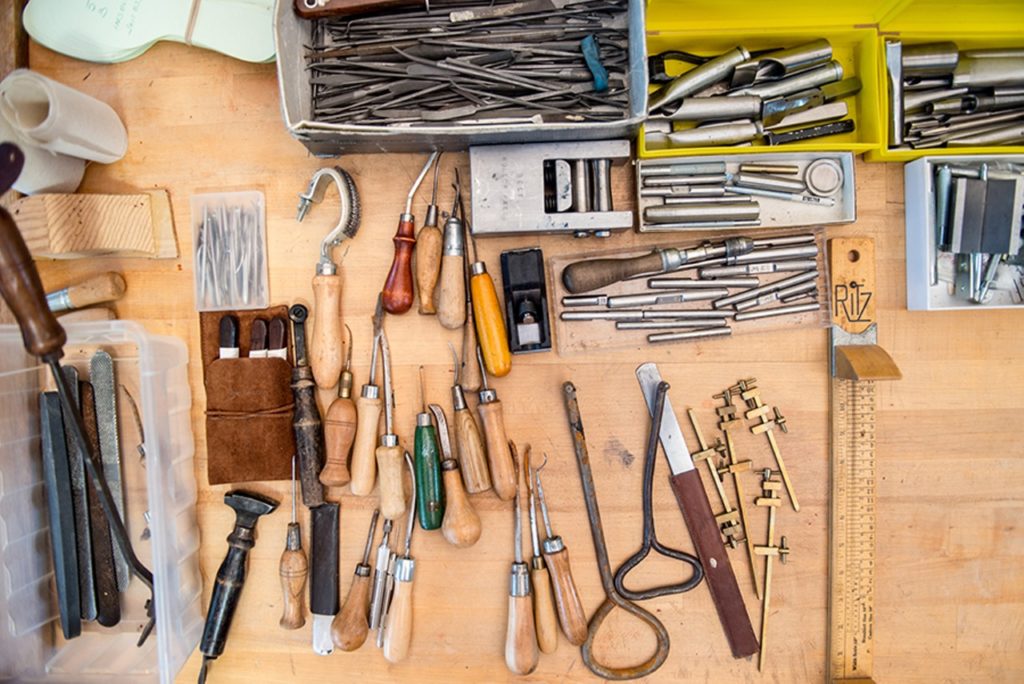
When a fellow shoemaker retired, Sara acquired his tools. via Chicago Reader.
Over the years, Sara had always survived through good times and bad. Over the years, she had found ways to cope – by taking on a second job, washing windows, or having a roommate to help with rent. For the sake of her school, she was willing to adjust her lifestyle and live more frugally.
But though she got help setting up her school from others, her biggest challenges were also from other people.
Starting the School meant making decisions about people
For the first time, Sara had to work with other people. She had to be a boss to the business, a manager of her staff, and a mentor to her students, all at once — very different from her one-woman-business days.
On her own, Sara had worked on a few collaborations with others, but she was wary. She had lost money in previous business ventures and had become a little more careful about working with people. By nature, she was open and warm; but as a business owner and a boss, she had to make harsher decisions.
Sara recounted the painful experience of hiring somebody for a role that didn’t work out. There was also a student who ended up bringing their problems to the school. For the usually warm and friendly Sara, having to turn them away was a difficult experience, one that she had little experience with.
But over time, Sara realized that she was in a position of responsibility. Her staff looked to her to make decisions and set an example. And Sara came to grips that she needed to make the difficult but right choices for the good of the school.
Over time, Sara’s efforts in sharing her skills paid off
For all her stress and anxiety, the school began to take off. Students responded well to Sara’s openness and warmth. Many of them worked in offices and were delighted to create something with their own hands.
As her students made their first shoes, Sara saw a familiar excitement and joy come into their eyes – the same as when her customers received their shoes from Sara.
Over time, a community developed around the school. Students stayed on to become instructors and assistants to Sara. The city of Chicago also opened up to Sara. Newspapers and TV shows were keen to feature Sara’s school as a Chicago institution, and she got plenty of press and attention – including a local news network and a feature in the Chicago Tribune.
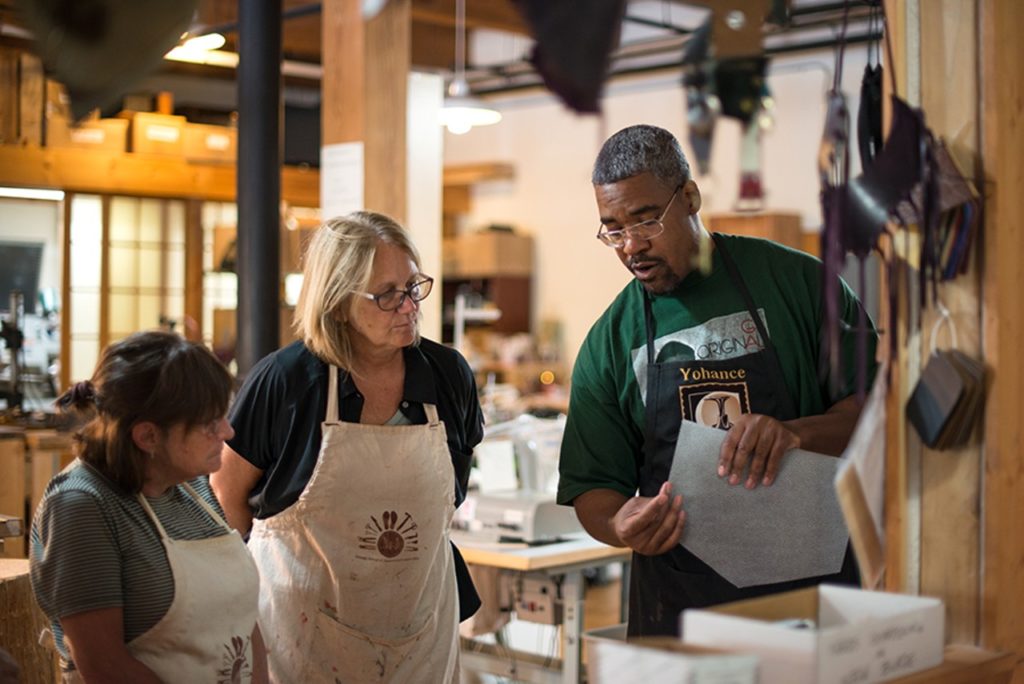
Instructor Yohance Lacour started as a student and has since launched a sneaker brand under Sara’s mentorship. Via Chicago Reader
When Covid-19 hit, the school was forced to move online, and it was a shock to the business model. Sara still managed to survive by offering online classes, as well as at-home leathermaking kits for students to work with. The school has since reopened but is struggling amidst the uncertainty of the pandemic.
For Sara, the school is a culmination of her life’s work; not just a business or a classroom, but her social circle and her community. Sara spends all her time at the school because her students aren’t her customers, they’re her friends. The school has become her life.
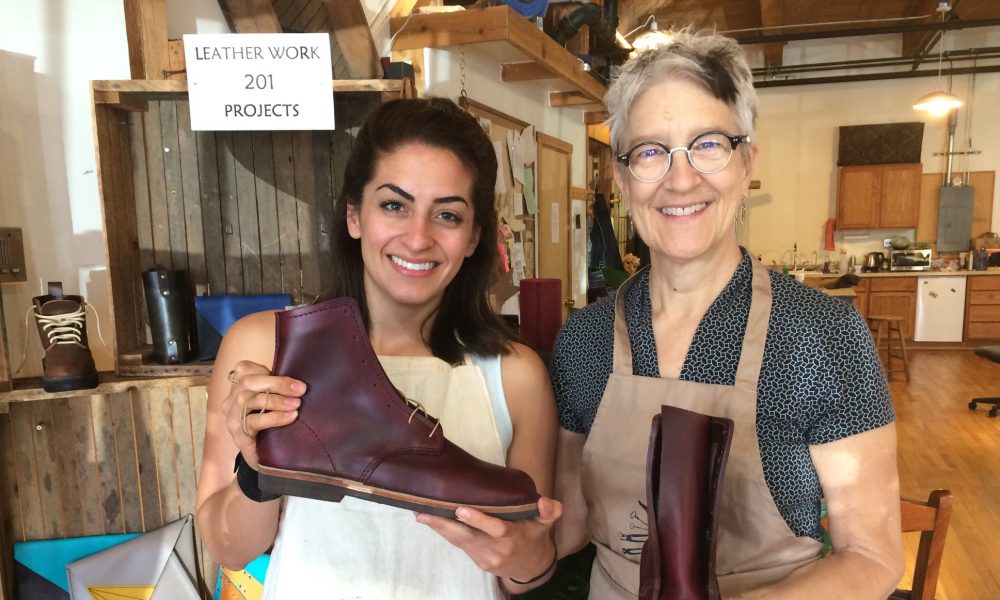
Sara with a happy student. The community helped Sara raise funds to survive the first part of the pandemic. Via Voyage Chicago
Sara’s willingness to share her skills created a community and a support system for her. She is grateful for the chance to have a second career in shoemaking, and that has made her past sacrifices and hardship worth it.
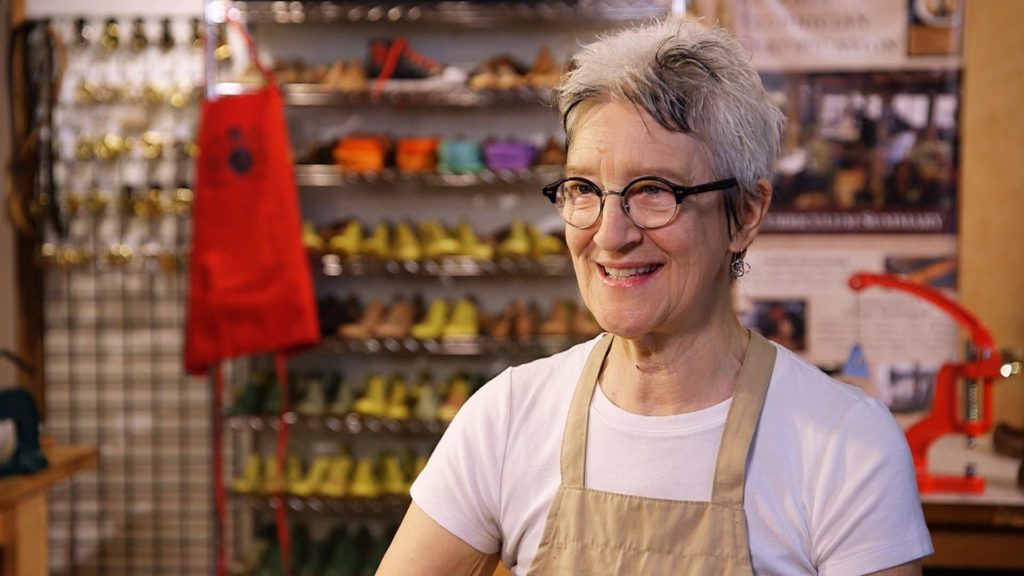
Sara McIntosh founded a business and found a community. Via Today.com
…
Sara McIntosh founded the Chicago School of Shoemaking, where you can learn to make leather shoes, sneakers, and accessories. Online classes are available. There’s currently a GoFundMe to help the school survive the difficult pandemic season.
Merchant Stories: Real entrepreneur stories from real people. If you’d like to share your merchant stories, email us.


